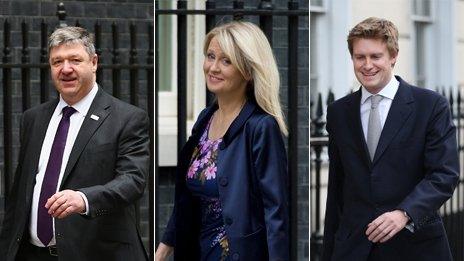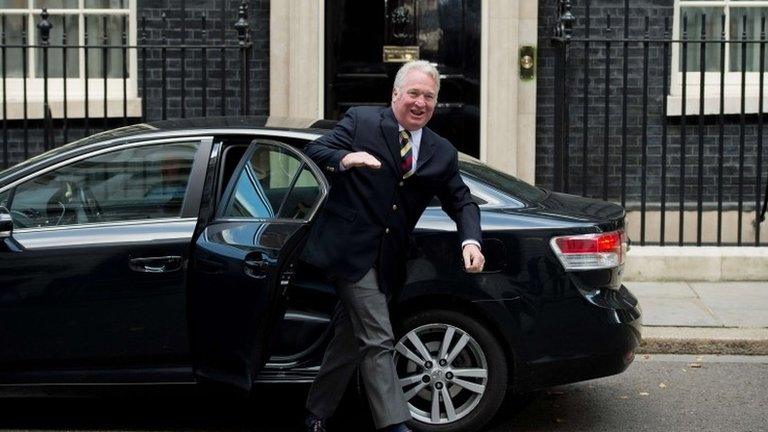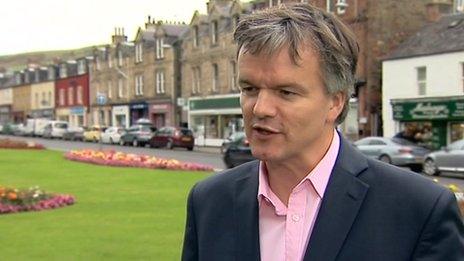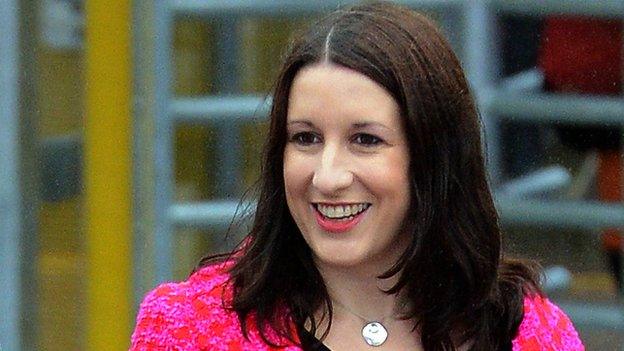The face of politics changes in a day of reshuffling
- Published

Newly promoted MPs Alistair Carmichael, Esther McVey and Tristram Hunt
Reshuffles. Like the old cliché about buses, you wait ages for one then three come along at once. But how much of an impact will the latest changes in personnel have?
Inside the coalition, the Conservative and Lib Dem leaders independently decided the fate of their ministers.
And Ed Miliband, no longer encumbered with a shadow cabinet chosen by his MPs, had a free hand to promote fresh talent.
But has the political territory shifted, or is it just the personalities that have been moved?
In some ways, the face of politics is changing.
Across the board, women are taking more prominent roles - so far, a net increase of four in government, and 44% of Labour's shadow cabinet are female.
Among the beneficiaries are two former stars of GMTV - Esther McVey for the Conservatives, and Labour's Gloria De Piero.
Flat caps?
The equation telegenic + down to earth = promotion has been proven. Though some rather less telegenic but talented people have done well too.
For the Conservatives, the reshuffle has also, in part, been about class as well as gender.
That isn't a misprint.
For the Conservatives, the reshuffle has also, in part, been about class.
What some of our tabloid colleagues have depicted as a process of replacing the "top hats" with the "flat caps".
In fact Monday didn't really amount to a revolution in millinery. It's simply that some of those who haven't been to public school are winning more prominence.
Racing up the junior ranks is Sajid Javid, son of a bus driver from Rochdale.
And Mike Penning - a plain-speaking former soldier and fireman - will welcome the challenge of taking the heat for welfare reforms. As a former spokesman for Iain Duncan Smith, he should, at least, have a good working relationship with his boss.
So expect some of the non-cabinet ministers to speak with less expensive accents.
The long knife
Allies of the chancellor have also done well from the reshuffle: the aforementioned Mr Javid; Matthew Hancock, a former chief of staff to George Osborne; and the former Treasury whip Greg Hands, are all moving up.
Their careers may be moving forward but their advancement doesn't signal a change in direction.
None of the better-known Conservative figures around the cabinet table have been moved - any purge at the top will await the outcome of next year's European parliament elections.
It was, in fact, Nick Clegg rather than David Cameron that engaged in the night of the long knives. Or, rather, the long knife.
It was plunged into the front rather than the back of Micheal Moore, the Secretary of State for Scotland.
He had very competently carried out negotiations on the forthcoming referendum on Scottish independence.
But now that thorny issues over timing and, crucially, what question to put to the Scottish people, have had been smoothed over, it was felt that it was time to move on from the constitutional niceties and in to campaigning mode.
So step forward the robust figure of the former Lib Dem chief whip Alistair Carmichael, whose job it is now to tweak Alex Salmond's tail.
But at more junior level, Jeremy Browne was dismissed. This surprised some at Westminster as he had been seen as close to Nick Clegg, and he could never be described as a coalition-sceptic. Certainly working with Conservative ministers didn't seem to trouble his conscience.
So it's possible that the Lib Dem leader - while continuing to liaise closely with David Cameron's colleagues - also wants his own ministers to spell out the differences between the two coalition partners more clearly in the run-up to the next election.
But even Lib Dems raised eyebrows at Mr Browne's replacement at the Home Office, the former transport minster Norman Baker, the author of a book alleging a cover-up over Dr David Kelly, the government scientist whose death led to the Hutton inquiry.
'Vanity project'
At first glance Ed Miliband's reshuffle marks more of a shift in position - away from his party's Blairite past.
At education, Stephen Twigg - who had praised a "free school" in his area and worked hard to find a way of reconciling Michael Gove's creations with Labour's existing (and more hostile) policy - has been dumped from the shadow cabinet, as has Liam Byrne - the former shadow work and pensions secretary who accepted the principle of a cap on benefits payments.
And it just so happens that in an interview with the left-of-centre New Statesman earlier, the leader of the Unite trade union Len McCluskey had described both politicians in unflattering terms.
Labour sources, naturally, say that Ed Miliband didn't discuss his reshuffle with union leaders.
And certainly Tristram Hunt's appointment to replace Stephen Twigg hardly marks a lurch to the left.
He is close to Peter Mandelson and was parachuted into his Stoke constituency at the last election with the blessing of the then leadership.
And while he has reportedly described free schools as "a vanity project for yummy mummies", expect him to champion "parent-led academies" in the future .
Rather, he represents a bit of generational shift - someone who is younger than the Labour leader (not yet 40) and who can potentially appeal beyond the Westminster village - albeit to viewers of TV history shows on BBC Two and Four, rather than breakfast telly.
Labour insiders say they wanted to make space for some of the 2010 intake who could prove to be energetic campaigners. That was more important than whether they were Brownite or Blairite, David or Ed.
The new shadow women's and equalities minister Gloria De Piero is an admirer of Tony Blair and backed David Miliband as her party leader.
And there was additional ballast against the "Blairite purge" stories - which some of the papers will write tomorrow - in the shape of Lord Falconer. He is Tony Blair's former flatmate and he has agreed to advise the party on the transition from opposition to government.
Battle lines
The shunting of the former shadow transport secretary Maria Eagle to the environment brief has led to speculation that Labour is preparing to derail HS2.
Instead, party sources insist, Mary Creagh's move to transport from shadowing Defra is a tribute to her campaigning flair during the horsemeat scandal.
She is now going to be tasked with standing up not for the consumer but the commuter, arguing against higher fares as part of Labour's pre-election theme of tackling what it calls the cost-of-living crisis.
But if she is a fan of HS2, she may have to turn her campaigning skills to greater effect against some of her shadow cabinet colleagues who think the money could be better spent.
Amongst the sceptics is Ed Balls, supportive of the rail project in principle, but in practice stressing he can't back it "at any price".
And the shadow chancellor, like his opposite number, will be pleased to see some of his key allies in important posts - including Rachel Reeves, his former number two, taking over the work and pensions brief, and Vernon Coaker moving to shadow defence.
Michael Dugher, a redoubtable attack-dog who initially backed Ed Balls for leader, has been given a key role in planning for the next general election.
He will be joined by Douglas Alexander (in addition to his foreign affairs role) and Spencer Livermore - the former Gordon Brown apparatchik who was - he believed unfairly - criticised by some of his colleagues for the handling of the 2007 election-that-never-was.
Well, with fixed-term Parliaments now, there is little doubt when the next election will come.
But perhaps the wider significance of the Labour reshuffle is what it says about the other Ed.
The fact that Messrs Twigg and Byrne accepted demotions, and Jim Murphy moved from defence to international development, suggests that his leadership is secure - that there is no prospect of a shadowy group of Blairites outside of the shadow cabinet waiting - or campaigning - for Ed Miliband's political demise.
At least, not this side of an election.
So, in the days and months ahead, the battle lines will be more clearly drawn between rather than within the parties.
- Published7 October 2013

- Published7 October 2013

- Published7 October 2013
